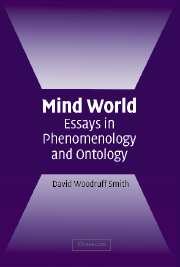Book contents
- Frontmatter
- Contents
- Prolegomena: The Terroir of Consciousness and the World
- Origins of the Essays
- Overview: A Story Line
- The Picture
- 1 Three Facets of Consciousness
- 2 The Cogito circa a.d. 2000
- 3 Return to Consciousness
- 4 Consciousness in Action
- 5 Background Ideas
- 6 Intentionality Naturalized?
- 7 Consciousness and Actuality
- 8 Basic Categories
- Coda: The Beetle in the Box
- Appendix: Background Conceptions of Ontology, Phenomenology, Philosophy of Mind, and Historical Philosophy
- Index
Appendix: Background Conceptions of Ontology, Phenomenology, Philosophy of Mind, and Historical Philosophy
Published online by Cambridge University Press: 05 June 2012
- Frontmatter
- Contents
- Prolegomena: The Terroir of Consciousness and the World
- Origins of the Essays
- Overview: A Story Line
- The Picture
- 1 Three Facets of Consciousness
- 2 The Cogito circa a.d. 2000
- 3 Return to Consciousness
- 4 Consciousness in Action
- 5 Background Ideas
- 6 Intentionality Naturalized?
- 7 Consciousness and Actuality
- 8 Basic Categories
- Coda: The Beetle in the Box
- Appendix: Background Conceptions of Ontology, Phenomenology, Philosophy of Mind, and Historical Philosophy
- Index
Summary
In the following remarks I try to outline the broad conceptual, methodological, and historical background assumed in the preceding chapters. This background is part of the unity of views developing in the chapters themselves, although the chapters are intended to be accessible without digging into this background. Of course, one's own background is often the most difficult part of one's philosophy to articulate.
The Theory of Consciousness and World in Recent Philosophy
The headwinds in philosophy are strong. They are the winds of fashion.
Metaphysics has been under suspicion for three centuries, first in the age of science and recently in the era of cultural interpretation. Yet what we need in philosophy today is a more systematic ontology, framing a wide metaphysics that is cognizant of discoveries in physics, neuroscience, and evolutionary biology alongside analyses of our own consciousness and our cultural practices and institutions.
Phenomenology has been under suspicion for half a century, as philosophy turned away from conscious experience. The tradition of analytic philosophy turned toward language – ordinary language, symbolic logic, then computer languages – and then toward naturalism, eyeing the marvels of quantum mechanics, relativity theory, and evolutionary biology. Continental philosophy too came to stress language, discourse, text, and cultural practice over consciousness. Yet what we need today, to understand the phenomena of consciousness much discussed in recent philosophy of mind oriented to cognitive neuroscience, is a more systematic phenomenology, framing a careful analysis of structures of subjective experience.
- Type
- Chapter
- Information
- Mind WorldEssays in Phenomenology and Ontology, pp. 289 - 304Publisher: Cambridge University PressPrint publication year: 2004

